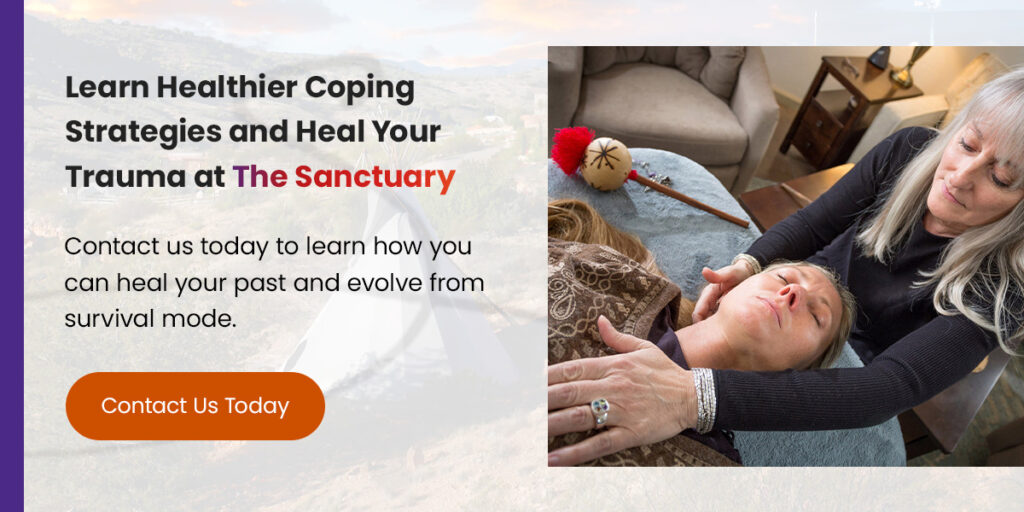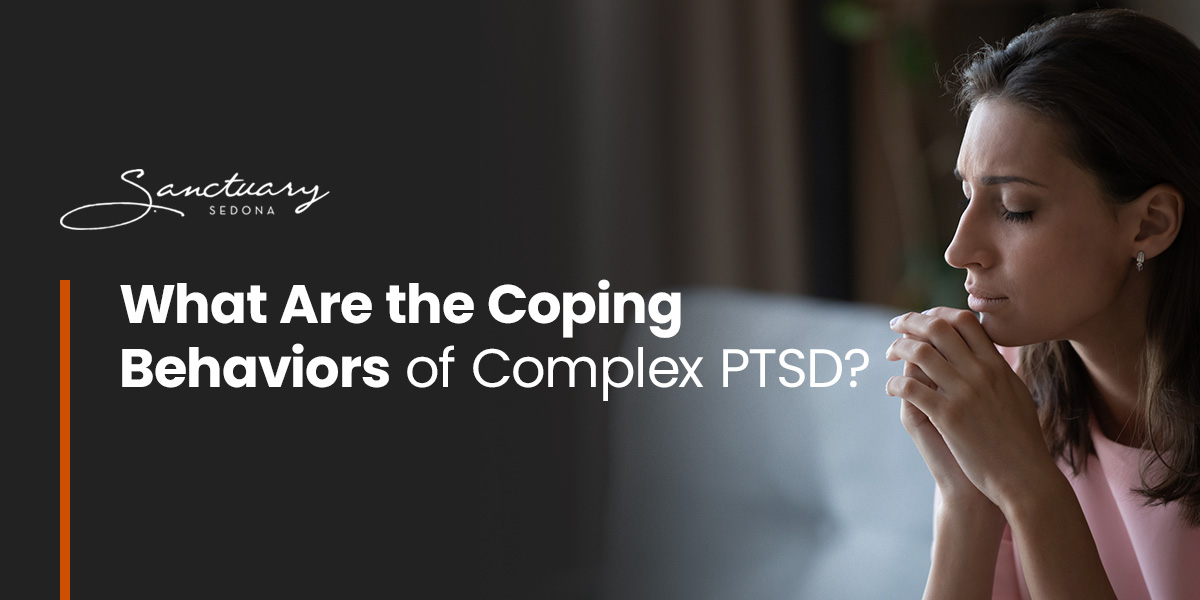What Are the Coping Behaviors of Complex PTSD?
If you’ve experienced complex trauma, you might notice certain habits you’ve developed in response. Some might be healthy ways to process your feelings around your past, but others could be cause for concern.
It’s never too late to identify and adapt how you cope with your trauma. Going to a holistic trauma treatment program can help you heal your unresolved trauma and learn healthier ways of dealing with its effects.
What Is Complex PTSD?
C-PTSD or complex post-traumatic stress disorder, is a mental health condition that may develop due to exposure to chronic trauma. While PTSD can develop following a single traumatic event like a car accident, c-PTSD can be the result of long-term traumatic experiences. For example, individuals may develop c-PTSD from ongoing childhood traumas like neglect or abuse. In other cases, domestic abuse, witnessing constant abuse and war or combat experiences can also foster the development of this condition.
While PTSD and c-PTSD share some common symptoms like depression and flashbacks, c-PTSD involves a set of unique additional symptoms. The common symptoms of complex PTSD include the following:
- Difficulty regulating emotion: Complex PTSD can cause emotional dysregulation. You may lose control over your emotions and experience sudden bouts of uncontrollable anger or sadness. Suicidal ideation is also common.
- Difficulty maintaining healthy relationships: You may find it difficult to trust and interact with others due to a negative self-view and a negative worldview. Maintaining relationships or having social interactions could also feel challenging.
- A negative self-view: Chronic exposure to trauma can leave someone feeling helpless, worthless and even ashamed.
- Changes in worldview or beliefs: Enduring ongoing trauma can impact your view of the world, causing a loss of faith in previously held beliefs.
- Detachment from the trauma: Chronic trauma survivors may experience amnesia surrounding the events. You may recall events differently or not at all.
These experiences can affect your ability to function on a daily basis — c-PTSD triggers can set off memories of the trauma or spark episodes of intense emotional reactions. While these reactions can include panic attacks, anxiety, aggression or emotional withdrawal, triggers can range from sights, sounds, smells and even feelings that link to the traumatic events.
Harmful Coping Mechanisms of C-PTSD
Complex trauma can make it hard to respond to stress in a helpful way. If you use any of the following to manage ongoing trauma, treatment could help you gain new tools that don’t compromise your well-being. Below are some common PTSD coping behaviors.
Substance Misuse
C-PTSD can cause chronic emotional distress, which may cause survivors to use alcohol or substances to cope with the overwhelming psychological symptoms. This approach can lead to substance use disorder. Post-traumatic stress disorders commonly co-occur in individuals with substance use disorder. As a result, complex PTSD coping skills often involve substance misuse.
If you have experienced chronic trauma and don’t have healthy ways to process your emotions, you might use drugs or alcohol to manage your symptoms. You might have emotional outbursts without cause. Or, the opposite may be true — you might feel numb to life. In either case, using drugs might ease these emotional responses. If that’s the case, you might start smoking weed to calm yourself down and lessen your outbursts or use stimulants like cocaine to feel pleasure again.
Other symptoms of c-PTSD, like a negative self-view and relationship difficulty, may lead to social anxiety. You might start to use alcohol to ease social anxiety. Or you may use drugs with others as a way to relate to them.
When you don’t have another way to manage your symptoms, drugs or alcohol can seem like the easiest fix. But substance use won’t help you heal from your trauma. Instead, substance misuse can result in new trauma. The short-term physical impacts of drug use range from headaches and seizures to heart attacks and comas, which are all traumatizing experiences. At the same time, the mental impacts of drug use can cause anxiety, depression, violent behavior and others that can worsen the symptoms of c-PTSD.

Finding a trauma-informed addiction treatment program can support you in healing both your trauma and your addiction.
The Need to Control
The type of trauma that causes c-PTSD is chronic and difficult to escape. As a result, many people develop issues with control because they weren’t in charge before.
Studies link disordered eating and chronic childhood trauma, and researchers believe that the link is about control. If you didn’t have control over your life or body before, you may attempt to regain it through food. Other studies indicate a link between exercise addiction and childhood trauma relating to the same unfulfilled need.
People with complex trauma may also develop workaholism or chronic overworking as a coping strategy. You can control how hard you work, even if you can’t control your emotions or thoughts. Focusing on work can help distract you from your trauma or boost your self-esteem. However, working yourself to the point of burnout can adversely impact your mental health.
Self-Destructive Behaviors
C-PTSD makes other high-risk behaviors, including self-harm, unsafe sex and speeding or drinking while driving, more likely. While these may seem like welcome distractions, they’re certainly not acts of self-love.
If your coping strategies are causing you harm, stopping them is extremely important. The safe residential treatment environment is a great place to address what’s causing self-destructive coping strategies.
Avoidance
People with c-PTSD often may experience two types of avoidance:
- Emotional avoidance occurs when you try to prevent thinking about or feeling your trauma. If you’ve experienced childhood abuse, for example, you might avoid thinking about your early life or shut down sad feelings when they arise. This strategy can also contribute to why people start using drugs or alcohol after exposure to trauma. You might use them to distract yourself or forget.
- Behavioral avoidance, on the other hand, is avoiding triggers of your trauma. For example, you might stay away from the traumatic event’s physical location.
Emotional avoidance can lead to people-pleasing behaviors, especially if someone you trusted caused your trauma. You might try to smooth things over more than necessary or lose your voice in a relationship because you’re avoiding conflict that reminds you of the past. However, emotional avoidance can lead to anger and aggression. You may react in anger when silencing your own emotions.
Excessive behavioral avoidance can also cause problems. Like all coping methods, avoidance is a survival strategy. It’s your body’s way of trying to keep you safe. But avoiding thoughts, feelings and situations can mean you miss out on life. Only by resolving your trauma can you truly move past it.
Detachment
Like avoidance, dissociation and detachment can manifest from long-term trauma exposure as a coping mechanism. Detachment can become a coping skill — you find it difficult to connect to others, especially emotionally. This situation can lead to self-isolation or a lack of close relationships.
Having trouble forming and maintaining healthy relationships is a primary symptom of c-PTSD. Maybe your trauma taught you that trusting another person is dangerous or that getting close to somebody just leads to hurt. So to protect yourself, you won’t get close to others so they can’t hurt you. In rehab for PTSD, you can reframe what you want your relationships to look like and how supportive connections can make you feel safe and loved.
Lashing Out
A person with complex PTSD may start lashing out as a response. Having extreme emotional responses, even to small stresses, is common for people with c-PTSD. If you lash out and don’t know why, you may be able to trace it back to your trauma.
And while it’s a very common response, you’re still responsible for how you handle situations. Seeking treatment for your trauma and learning new ways to cope can set you up for success in all aspects of life.
Healthy Coping Strategies for Complex PTSD
Living with complex trauma can lead to some harmful coping strategies. But it’s not your fault. Your body and mind are doing the best they can to protect you from further hurt. But living with those patterns can hurt, too.
Developing healthier ways to cope can help you live a fuller life so you don’t have to live in fear or isolation.
Meditation
Mindfulness meditation is an excellent way to cope with trauma, especially from childhood. Meditation can alleviate PTSD symptoms by improving mood, lowering stress and reducing intrusive thoughts. Meditation can help you relax and may even rewire your brain for the better.
Meditation is a great tool to have in your kit, especially when you feel overwhelmed by stress. If you’re not sure where to start, you can take meditation classes to develop your practice or listen to guided meditations in the comfort of your home.
Physical Activity
Exercising — particularly doing cardio workouts — is a fantastic way to cope with your trauma. Studies show that physical activity may decrease hypervigilance, improve mental clarity and reduce inflammation. Plus, it can decrease anxiety and depression symptoms. And it doesn’t have to be intense. Walking, cycling and even doing household chores can all contribute to a healthier mindset.
However, it’s important to recognize when a healthy coping strategy turns into an unhealthy one. If you can’t take a day off without extreme guilt or you exercise through injuries, that could be a sign of an exercise addiction developing.
Art Therapy
Sometimes, we don’t want to talk about our trauma — other times, we may not even have the words to do so. In those instances, art therapy can help process emotions without needing to express them verbally. Plus, you might find it easier to organize your thoughts around your trauma visually because it activates both sides of your brain at once.
Art therapy can take many forms. Some people like to use paints to create a visual representation of their trauma. Others may prefer to use writing, dance, creative movement or music to tell their story. Whatever helps you process your emotions is the right choice.
Balanced Diet
Eating healthy meals and taking nutritional supplements can be an incredible way to start feeling better mentally and physically. Your gut health plays a huge role in your overall well-being, especially your mental wellness. By eating nutrient-dense foods, you can lower inflammation and stress levels, improve your digestive health and enhance your mood.
Plus, trauma can foster negative eating behaviors like a poor diet. That’s why, at The Sanctuary, we use nutrition to heal your body and mind from trauma. We also teach nutritional education so you can return to your life with the skills to cook healthy meals that support your long-term recovery.
Learn Healthier Coping Strategies and Heal Your Trauma at The Sanctuary
Managing symptoms and finding healthy coping methods is an important step in your healing journey. But only by resolving your trauma in a safe and supportive environment can you free yourself of its lasting effects.
Contact us today to learn how you can heal your past and evolve from survival mode. C-PTSD therapy can be your first step to a healthier and happier life.

Kelley Alexander JD. is the co-director of The Sanctuary at Sedona and has worked over the last decade to develop its innovative Integrative Addiction Recovery Program that has helped hundreds of clients to be recovered from addiction and co-occurring disorders. Through her pioneering work, Kelley and her team at The Sanctuary also work with clients to overcome issues related to codependency, anxiety, depression, and PTSD. A JD and former practicing attorney, Kelley holds a BA in World Religions and has done graduate work in psychology. She is an ordained minister, certified shamanic breathwork facilitator, and a graduate of the Four Winds Healing The Light Body School, the premier energy medicine program founded by Alberto Villoldo. Kelley has also been a student of Dr. Joe Dispenza since 2009. She is a member of the Association for Comprehensive Energy Psychology and the Institute for Holistic Addiction Studies. She is a frequent lecturer at seminars and conferences throughout the United States.
[email protected]


